
puck San Jose Sharks
usinfo | 2013-06-21 12:06
| San Jose Sharks | |
| 2012–13 San Jose Sharks season | |
 |
|
| Conference | Western |
| Division | Pacific |
| Founded | 1991 |
| History |
San Jose Sharks 1991–present |
| Home arena | HP Pavilion at San Jose |
| City | San Jose, California |
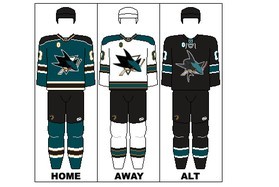 |
|
| Colors |
Deep Pacific teal, burnt orange, black, white |
| Media |
CSN California K-FOX (98.5 FM) |
| Owner(s) |
San Jose Sports & Entertainment Enterprises (Hasso Plattner, governor[1]) |
| General manager | Doug Wilson |
| Head coach | Todd McLellan |
| Captain | Joe Thornton |
| Minor league affiliates |
Worcester Sharks (AHL) San Francisco Bulls (ECHL) |
| Stanley Cups | 0 |
| Conference championships | 0 |
| Presidents' Trophies | 1 (2008–09) |
| Division championships | 6 (2001–02, 2003–04, 2007–08, 2008–09, 2009–10, 2010–11) |
| Official website | sharks.nhl.com |
The San Jose Sharks are a professional ice hockey team based in San Jose, California, United States. They are members of the Pacific Division of the Western Conference of the National Hockey League (NHL). They play their home games at the HP Pavilion at San Jose, known locally as the Shark Tank.
History
Bringing hockey back to the Bay Area
The Oakland Coliseum Arena was home to the California Golden Seals of the NHL from 1967 to 1976. Gordon and George Gund III became minority owners of the Seals in 1974, and were instrumental in their move to Cleveland in 1976 and a 1978 merger with the Minnesota North Stars, which they purchased that year. They had long wanted to bring hockey back to the Bay Area, and asked the NHL for permission to move the North Stars there in the late 1980s, but the league vetoed the proposed move. Meanwhile, a group led by former Hartford Whalers owner Howard Baldwin was pushing the NHL to bring a team to San Jose, where a new arena was being built. Eventually the league struck a compromise: the Gunds would sell their share of the North Stars to Baldwin's group, with the Gunds receiving an expansion team in the Bay Area to begin play in the 1991–92 season and being allowed to take a certain number of players from the North Stars to their new club.[2] In return, the North Stars would be allowed to participate as an equal partner in an expansion draft with the new Bay Area team.
On May 5, 1990, the Gunds officially sold their share of the North Stars to Baldwin and were awarded a new team for the Bay Area, based in San Jose. Over 5,000 potential names were submitted by mail for the new team. While the first-place finisher was "Blades," the Gunds were concerned about the name's potentially negative association with weapons, and went with the runner-up, "Sharks."[3] The name was said to have been inspired by the large number of sharks living in the Pacific Ocean. Seven different varieties live there, and one area of water near the Bay Area is known as the "red triangle" because of its shark population.
When the WHA was formed in 1972, the franchise that was awarded to San Francisco was named the Sharks. Funding fell through and the franchise was awarded to a group from Quebec (where the team would become the Nordiques). After this, a WHA franchise in Los Angeles took the Sharks name.
The team's first marketing head, Matt Levine, said of the new name, "Sharks are relentless, determined, swift, agile, bright and fearless. We plan to build an organization that has all those qualities."
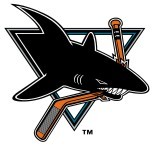
San Jose's first logo (1991–2007).
Cow Palace years (1991–93)
For their first two seasons, the Sharks played at the Cow Palace in Daly City, just outside San Francisco, a facility that the NHL and the Seals had rejected in 1967. Pat Falloon was their first draft choice, and led the team in points during their first season. George Kingston was their first coach during their first two seasons.[5] Though the 1991–92 roster consisted primarily of NHL journeymen, minor leaguers and rookies, the Sharks had at least one notable player when they acquired 14-year veteran and former Norris Trophy-winning defenseman Doug Wilson from the Chicago Blackhawks on September 6, 1991. Wilson was named the team's first captain and All-Star representative in the inaugural season. The Sharks, however, did not perform as well during their first two seasons – the 71 losses in 1992–93 is an NHL record, and they also suffered a 17-game losing streak, while winning just 11 games and earning a mere 24 points in the standings. Kingston was fired following the end of the 1992–93 season.
Despite the Sharks futility in the standings, the team lead the NHL's merchandise sales with $150 million, accounting for 27% of the league's total and behind only NBAchampions Chicago Bulls among all North American leagues.
Several team "firsts" happened in the 1992–93 season. On November 17, 1992, San Jose goaltender Arturs Irberecorded the first shutout in team history, defeating the Los Angeles Kings 6–0. On December 3 against the Hartford Whalers at the Cow Palace, right winger Rob Gaudreau scored the first hat trick in franchise history; he also scored the team's second ever hat trick nine days later against the Quebec Nordiques.
For their first two seasons, the Sharks played at the Cow Palace in Daly City, just outside San Francisco, a facility that the NHL and the Seals had rejected in 1967. Pat Falloon was their first draft choice, and led the team in points during their first season. George Kingston was their first coach during their first two seasons.[5] Though the 1991–92 roster consisted primarily of NHL journeymen, minor leaguers and rookies, the Sharks had at least one notable player when they acquired 14-year veteran and former Norris Trophy-winning defenseman Doug Wilson from the Chicago Blackhawks on September 6, 1991. Wilson was named the team's first captain and All-Star representative in the inaugural season. The Sharks, however, did not perform as well during their first two seasons – the 71 losses in 1992–93 is an NHL record, and they also suffered a 17-game losing streak, while winning just 11 games and earning a mere 24 points in the standings. Kingston was fired following the end of the 1992–93 season.
Despite the Sharks futility in the standings, the team lead the NHL's merchandise sales with $150 million, accounting for 27% of the league's total and behind only NBAchampions Chicago Bulls among all North American leagues.
Several team "firsts" happened in the 1992–93 season. On November 17, 1992, San Jose goaltender Arturs Irberecorded the first shutout in team history, defeating the Los Angeles Kings 6–0. On December 3 against the Hartford Whalers at the Cow Palace, right winger Rob Gaudreau scored the first hat trick in franchise history; he also scored the team's second ever hat trick nine days later against the Quebec Nordiques.
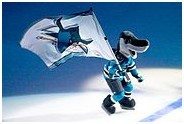
S.J. Sharkie, the Sharks' mascot, made his debut during the 1991–92 season.
The early era also saw the birth of the San Jose Sharks long-time mascot, S. J. Sharkie. On January 28, 1992, at a game vs. the New York Rangers, the then-unnamed mascot emerged from a Zamboni during an intermission. A "Name the Mascot" contest began that night, with the winning name of "S. J. Sharkie" being announced on April 15, 1992.[7]
Early success and rebuilding (1993–97)
For their third season, 1993–94, the Sharks moved to their current home, the San Jose Arena (now the HP Pavilion at San Jose).[8] Under head coach Kevin Constantine, the Sharks pulled off the biggest turnaround in NHL history, finishing with a 33–35–16 record, making the playoffs with 82 points — a 58-point jump from the previous season.[9] They were seeded eighth in the Western Conference playoffs and faced the Detroit Red Wings, one of the favorites in the Western Conference to win the Stanley Cup. In one of the biggest upsets in Stanley Cup playoff history, the underdog Sharks shocked the Red Wings in seven games. In Game 7 at Joe Louis Arena, Jamie Baker scored the game-winning goal in the 3rd period after goalie Chris Osgood was out of position and the Sharks won 3–2.[10] In the second round, the Sharks had a 3–2 series lead over the Toronto Maple Leafs but lost the final two games in Toronto, including an overtime loss in Game 6.
In 1994–95, the Sharks earned their second straight playoff berth and again reached the second round. Ray Whitney scored a goal in double overtime of Game 7 of the Conference Quarterfinals against the Calgary Flames. Key Sharks players were goalie Arturs Irbe, defenseman Sandis Ozolinsh and forwards Igor Larionov and Sergei Makarov. Despite their success against Calgary, round 2 would prove to be a disaster for the Sharks, when they lost in a four game sweep to Detroit (in a rematch of the previous year) without even holding a single lead in all 4 games. However, the 1995 season also saw the only rainout in the history of the NHL, when the Guadalupe River flooded its banks in March 1995, making it impossible for anyone to get into the San Jose Arena for a game between the Sharks and the Red Wings.
Early success and rebuilding (1993–97)
For their third season, 1993–94, the Sharks moved to their current home, the San Jose Arena (now the HP Pavilion at San Jose).[8] Under head coach Kevin Constantine, the Sharks pulled off the biggest turnaround in NHL history, finishing with a 33–35–16 record, making the playoffs with 82 points — a 58-point jump from the previous season.[9] They were seeded eighth in the Western Conference playoffs and faced the Detroit Red Wings, one of the favorites in the Western Conference to win the Stanley Cup. In one of the biggest upsets in Stanley Cup playoff history, the underdog Sharks shocked the Red Wings in seven games. In Game 7 at Joe Louis Arena, Jamie Baker scored the game-winning goal in the 3rd period after goalie Chris Osgood was out of position and the Sharks won 3–2.[10] In the second round, the Sharks had a 3–2 series lead over the Toronto Maple Leafs but lost the final two games in Toronto, including an overtime loss in Game 6.
In 1994–95, the Sharks earned their second straight playoff berth and again reached the second round. Ray Whitney scored a goal in double overtime of Game 7 of the Conference Quarterfinals against the Calgary Flames. Key Sharks players were goalie Arturs Irbe, defenseman Sandis Ozolinsh and forwards Igor Larionov and Sergei Makarov. Despite their success against Calgary, round 2 would prove to be a disaster for the Sharks, when they lost in a four game sweep to Detroit (in a rematch of the previous year) without even holding a single lead in all 4 games. However, the 1995 season also saw the only rainout in the history of the NHL, when the Guadalupe River flooded its banks in March 1995, making it impossible for anyone to get into the San Jose Arena for a game between the Sharks and the Red Wings.
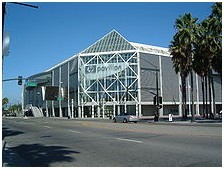
The HP Pavilion at San Jose, nicknamed "The Shark Tank" by both fans and media alike
In 1995–96, the Sharks finished last in the Pacific Division and failed to make the playoffs. The team also underwent major changes: during the season they traded Ozolinsh and Larionov; Irbe, who had suffered an off-ice injury, was released at the end of the season. The team began rebuilding, acquiring forward Owen Nolan from the Colorado Avalanche, as well as several other players. Constantine was fired midway through the season and replaced by interim coach Jim Wiley.
The next season was no better under Al Sims, with the Sharks again finishing last and winning only 27 games. Their standing would help them draft Patrick Marleau in the 1997 NHL Entry Draft.
Darryl Sutter years (1997–2002)
The Sharks returned to the playoffs in 1997–98, with goalie Mike Vernon, whom they acquired from the Red Wings, and new head coach Darryl Sutter. For the next two years, the Sharks made the playoffs, yet never advanced past the first round. In 1999, San Jose acquired former Toronto and Montreal star Vincent Damphousse.
San Jose's luck changed in the 1999–2000 season, when the Sharks finished with their first-ever winning record. In an upset on par with the one they had pulled on Detroit six years earlier, the Sharks managed to eliminate the St. Louis Blues, who had finished first overall in the league that year, in seven games. However, the Sharks were defeated in the second round of the playoffs by the Dallas Stars. It was their second time losing to Dallas.
In 2000–01, Kazakh goalie Evgeni Nabokov won the Calder Memorial Trophy as the league's best rookie. The team also acquired Finnish star forward Teemu Selanne from the Mighty Ducks of Anaheim. In the2001 playoffs, the Blues eliminated the Sharks in six games in the first round, avenging their 2000 defeat by San Jose. The team's breakout year was 2001–02. Veteran Adam Graves was acquired for Mikael Samuelsson. The Sharks won their first Pacific Division title, and defeated the Phoenix Coyotes in the first round, but fell to the Colorado Avalanche in the second.
Following the 2001–02 season, the Gunds sold the Sharks to a group of local investors headed by team president Greg Jamison. With starting goaltender Nabokov and defenseman Mike Rathje in contract disputes with general manager Dean Lombardi and the retirement of veteran defenseman Gary Suter, the team got off to a terrible start. Kyle McLaren was acquired in a three-way trade with the Montreal Canadiens and Boston Bruins. Dan McGillis was acquired in exchange for long-time Shark Marcus Ragnarsson, but the team could not turn itself around. Sutter was fired and replaced by Ron Wilson midway through that season.
Ron Wilson years (2003–08)
In 1995–96, the Sharks finished last in the Pacific Division and failed to make the playoffs. The team also underwent major changes: during the season they traded Ozolinsh and Larionov; Irbe, who had suffered an off-ice injury, was released at the end of the season. The team began rebuilding, acquiring forward Owen Nolan from the Colorado Avalanche, as well as several other players. Constantine was fired midway through the season and replaced by interim coach Jim Wiley.
The next season was no better under Al Sims, with the Sharks again finishing last and winning only 27 games. Their standing would help them draft Patrick Marleau in the 1997 NHL Entry Draft.
Darryl Sutter years (1997–2002)
The Sharks returned to the playoffs in 1997–98, with goalie Mike Vernon, whom they acquired from the Red Wings, and new head coach Darryl Sutter. For the next two years, the Sharks made the playoffs, yet never advanced past the first round. In 1999, San Jose acquired former Toronto and Montreal star Vincent Damphousse.
San Jose's luck changed in the 1999–2000 season, when the Sharks finished with their first-ever winning record. In an upset on par with the one they had pulled on Detroit six years earlier, the Sharks managed to eliminate the St. Louis Blues, who had finished first overall in the league that year, in seven games. However, the Sharks were defeated in the second round of the playoffs by the Dallas Stars. It was their second time losing to Dallas.
In 2000–01, Kazakh goalie Evgeni Nabokov won the Calder Memorial Trophy as the league's best rookie. The team also acquired Finnish star forward Teemu Selanne from the Mighty Ducks of Anaheim. In the2001 playoffs, the Blues eliminated the Sharks in six games in the first round, avenging their 2000 defeat by San Jose. The team's breakout year was 2001–02. Veteran Adam Graves was acquired for Mikael Samuelsson. The Sharks won their first Pacific Division title, and defeated the Phoenix Coyotes in the first round, but fell to the Colorado Avalanche in the second.
Following the 2001–02 season, the Gunds sold the Sharks to a group of local investors headed by team president Greg Jamison. With starting goaltender Nabokov and defenseman Mike Rathje in contract disputes with general manager Dean Lombardi and the retirement of veteran defenseman Gary Suter, the team got off to a terrible start. Kyle McLaren was acquired in a three-way trade with the Montreal Canadiens and Boston Bruins. Dan McGillis was acquired in exchange for long-time Shark Marcus Ragnarsson, but the team could not turn itself around. Sutter was fired and replaced by Ron Wilson midway through that season.
Ron Wilson years (2003–08)
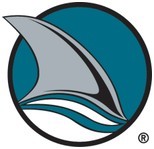
The Sharks' first alternate logo, showing a shark fin emerging from water (1991–2007)
Near the 2003 NHL trade deadline, captain Owen Nolan was traded to the Toronto Maple Leafs, signaling a new era in Sharks history. In addition, the newly-acquired McGillis was traded to Boston, Bryan Marchment went to Colorado, and AHL star Shawn Heins and forward Matt Bradley were moved to Pittsburgh. The Sharks acquired Alyn McCauley and Wayne Primeau during this season.
Reportedly, due to having just acquired the team as well as the team's bad start, the ownership group wanted Lombardi to move high-priced players on the roster. Lombardi failed to do so, and as a result, lost his job. During that debacle year for San Jose, there were some bright spots. Jim Fahey led all rookie defensemen in points despite playing in only 43 games.
2003–04, under new general manager Doug Wilson and head coach Ron Wilson saw another turnaround for the team, resulting in the team's best season ever. An injection of youth, with players like Christian Ehrhoffand out-of-college signing Tom Preissing, and the influx of energy from Alexander Korolyuk jump-started San Jose. Wilson acquired Nils Ekman, and a line of Ekman, McCauley and Korolyuk provided strong play for San Jose, with all three players enjoying career years. Midway through the season, key forward Marco Sturm suffered a broken leg/ankle injury. In response, San Jose acquired Curtis Brown.
They posted the third-best record in the league with a team-record 104 points (31 more than the previous season, and the first time the team had earned 100 points), won the Pacific Division championship, and were seeded second in the Western Conference.
In the playoffs, the Sharks defeated the St. Louis Blues in the conference quarterfinals and the Colorado Avalanche in the conference semifinals. The San Jose Sharks, for the first time, went to the conference finals. However, they fell to the Calgary Flames in the conference finals with ex-coach Daryl Sutter behind the Flames' bench and former Sharks goaltender Miikka Kiprusoff in net. During that season, San Jose, without a captain following Nolan's trade, utilized a rotating captaincy. When the job eventually fell to Patrick Marleau, he kept the captaincy.
During the offseason forward Vincent Damphousse was lost to the Colorado Avalanche (but never played a game for them, as he announced his retirement during the 2004–05 lockout).
The Sharks started the 2005–06 season slowly, dropping to last place in the Pacific Division. The team lost Alexander Korolyuk. After a 10-game losing streak, the Sharks traded Brad Stuart, Wayne Primeau and Marco Sturm to the Boston Bruins for star player Joe Thornton. The trade re-energized the team, and with Nabokov sharing starting duties with backup goaltender Vesa Toskala, the Sharks rallied back from their early season slump to clinch the fifth seed in the Western Conference. In the playoffs, the Sharks defeated the Nashville Predators in the conference quarterfinals before falling to the Edmonton Oilers in the conference semifinals. Joe Thornton was awarded the Hart Memorial Trophy as the league's Most Valuable Player, as well as the Art Ross Trophy for leading the league in points, with a total of 125. Jonathan Cheechoo was awarded the Maurice 'Rocket' Richard Trophy for scoring the most goals during the regular season, with a total of 56.
Near the 2003 NHL trade deadline, captain Owen Nolan was traded to the Toronto Maple Leafs, signaling a new era in Sharks history. In addition, the newly-acquired McGillis was traded to Boston, Bryan Marchment went to Colorado, and AHL star Shawn Heins and forward Matt Bradley were moved to Pittsburgh. The Sharks acquired Alyn McCauley and Wayne Primeau during this season.
Reportedly, due to having just acquired the team as well as the team's bad start, the ownership group wanted Lombardi to move high-priced players on the roster. Lombardi failed to do so, and as a result, lost his job. During that debacle year for San Jose, there were some bright spots. Jim Fahey led all rookie defensemen in points despite playing in only 43 games.
2003–04, under new general manager Doug Wilson and head coach Ron Wilson saw another turnaround for the team, resulting in the team's best season ever. An injection of youth, with players like Christian Ehrhoffand out-of-college signing Tom Preissing, and the influx of energy from Alexander Korolyuk jump-started San Jose. Wilson acquired Nils Ekman, and a line of Ekman, McCauley and Korolyuk provided strong play for San Jose, with all three players enjoying career years. Midway through the season, key forward Marco Sturm suffered a broken leg/ankle injury. In response, San Jose acquired Curtis Brown.
They posted the third-best record in the league with a team-record 104 points (31 more than the previous season, and the first time the team had earned 100 points), won the Pacific Division championship, and were seeded second in the Western Conference.
In the playoffs, the Sharks defeated the St. Louis Blues in the conference quarterfinals and the Colorado Avalanche in the conference semifinals. The San Jose Sharks, for the first time, went to the conference finals. However, they fell to the Calgary Flames in the conference finals with ex-coach Daryl Sutter behind the Flames' bench and former Sharks goaltender Miikka Kiprusoff in net. During that season, San Jose, without a captain following Nolan's trade, utilized a rotating captaincy. When the job eventually fell to Patrick Marleau, he kept the captaincy.
During the offseason forward Vincent Damphousse was lost to the Colorado Avalanche (but never played a game for them, as he announced his retirement during the 2004–05 lockout).
The Sharks started the 2005–06 season slowly, dropping to last place in the Pacific Division. The team lost Alexander Korolyuk. After a 10-game losing streak, the Sharks traded Brad Stuart, Wayne Primeau and Marco Sturm to the Boston Bruins for star player Joe Thornton. The trade re-energized the team, and with Nabokov sharing starting duties with backup goaltender Vesa Toskala, the Sharks rallied back from their early season slump to clinch the fifth seed in the Western Conference. In the playoffs, the Sharks defeated the Nashville Predators in the conference quarterfinals before falling to the Edmonton Oilers in the conference semifinals. Joe Thornton was awarded the Hart Memorial Trophy as the league's Most Valuable Player, as well as the Art Ross Trophy for leading the league in points, with a total of 125. Jonathan Cheechoo was awarded the Maurice 'Rocket' Richard Trophy for scoring the most goals during the regular season, with a total of 56.
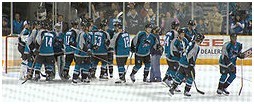
The Sharks celebrate a 4–0 victory over the Phoenix Coyotes on December 11, 2006
The Sharks entered the 2006–07 season as the youngest team in average age, as well as the biggest team in average weight, and they raced out to a 20–7–0 start, the best in franchise history. A concern made by fans and members of the media was the lack of a left winger to play on a line with the duo of Thornton and Cheechoo. Wilson seemingly addressed this issue by acquiring 25-year-old 20-goal-scorer Mark Bell from the Chicago Blackhawks. Despite scoring a goal in his first two games with San Jose, Bell was widely considered a flop in San Jose. Off-ice issues, including being cited for drunk driving and an alleged hit-and-run[12] contributed to his on-ice play. By the end of the season, Bell was consistently either a healthy scratch or a fourth-liner.
Two significant trades were made at the trade deadline for defenseman Craig Rivet and winger Bill Guerin. The trades coincided with Nabokov putting together a string of outstanding performances. The Sharks finished the regular season with the best record in franchise history at 51–26–5. In the conference quarterfinals, the Sharks defeated the Nashville Predators for the second year in a row. In the Western Conference semifinals, the Sharks were defeated for the 2nd time by the Detroit Red Wings.
In that offseason, San Jose lost defenseman Scott Hannan to the Colorado Avalanche but managed to re-sign pending free agent Rivet. They also added former USA star Jeremy Roenick to the roster. Roenick had considered retirement but decided to give it one last try with San Jose. San Jose effectively made Nabokov their number one goaltender by trading Toskala and Bell to the Toronto Maple Leafs.
The Sharks entered the 2006–07 season as the youngest team in average age, as well as the biggest team in average weight, and they raced out to a 20–7–0 start, the best in franchise history. A concern made by fans and members of the media was the lack of a left winger to play on a line with the duo of Thornton and Cheechoo. Wilson seemingly addressed this issue by acquiring 25-year-old 20-goal-scorer Mark Bell from the Chicago Blackhawks. Despite scoring a goal in his first two games with San Jose, Bell was widely considered a flop in San Jose. Off-ice issues, including being cited for drunk driving and an alleged hit-and-run[12] contributed to his on-ice play. By the end of the season, Bell was consistently either a healthy scratch or a fourth-liner.
Two significant trades were made at the trade deadline for defenseman Craig Rivet and winger Bill Guerin. The trades coincided with Nabokov putting together a string of outstanding performances. The Sharks finished the regular season with the best record in franchise history at 51–26–5. In the conference quarterfinals, the Sharks defeated the Nashville Predators for the second year in a row. In the Western Conference semifinals, the Sharks were defeated for the 2nd time by the Detroit Red Wings.
In that offseason, San Jose lost defenseman Scott Hannan to the Colorado Avalanche but managed to re-sign pending free agent Rivet. They also added former USA star Jeremy Roenick to the roster. Roenick had considered retirement but decided to give it one last try with San Jose. San Jose effectively made Nabokov their number one goaltender by trading Toskala and Bell to the Toronto Maple Leafs.
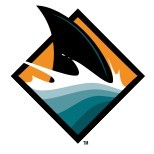
Current Sharks alternate fin logo
In advance of the 2007–08 season, the Sharks updated their logos and jerseys to adjust to the new Rbk EDGE jersey.[13] The Sharks rode on a very hot streak in the month of March. They were aided by the trade-deadline acquisition of Brian Campbell, for whom they gave up Steve Bernier. Going the entire month without a regulation loss, the Sharks captured their third division title with a franchise-record 108 points. San Jose started the playoffs beating the Calgary Flames four games to three in San Jose's first ever home Game 7. San Jose eventually lost to the Dallas Stars in the Western Conference Semifinals. Game 6 required four overtime periods, and was the longest game in the team's history. This was the Sharks 3rd playoff loss to Dallas.
The Ron Wilson era officially came to an end on Monday, May 12 when the Sharks fired Wilson, citing the Sharks' disappointing second round losses in the past three seasons.[14] Wilson ended his tenure in San Jose with an overall record of 206–134–45 in 385 regular-season games and a 28–24 record in 52 postseason games. Wilson moved on to be hired as head coach of the Toronto Maple Leafs along with assistant coaches who were also 2 former Sharks, Tim Hunter and Rob Zettler, to make up the Toronto coaching staff.
In advance of the 2007–08 season, the Sharks updated their logos and jerseys to adjust to the new Rbk EDGE jersey.[13] The Sharks rode on a very hot streak in the month of March. They were aided by the trade-deadline acquisition of Brian Campbell, for whom they gave up Steve Bernier. Going the entire month without a regulation loss, the Sharks captured their third division title with a franchise-record 108 points. San Jose started the playoffs beating the Calgary Flames four games to three in San Jose's first ever home Game 7. San Jose eventually lost to the Dallas Stars in the Western Conference Semifinals. Game 6 required four overtime periods, and was the longest game in the team's history. This was the Sharks 3rd playoff loss to Dallas.
The Ron Wilson era officially came to an end on Monday, May 12 when the Sharks fired Wilson, citing the Sharks' disappointing second round losses in the past three seasons.[14] Wilson ended his tenure in San Jose with an overall record of 206–134–45 in 385 regular-season games and a 28–24 record in 52 postseason games. Wilson moved on to be hired as head coach of the Toronto Maple Leafs along with assistant coaches who were also 2 former Sharks, Tim Hunter and Rob Zettler, to make up the Toronto coaching staff.
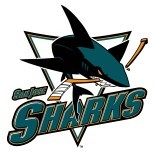
Current Sharks Wordmark + Logo
Todd McLellan years (2008–present)
On June 11, 2008, the San Jose Sharks named former Detroit Red Wings assistant coach, Todd McLellan, as their new head coach for the 2008–09 season. Todd Richards, Trent Yawney and Jay Woodcroft were named assistant coaches.
During the off season, San Jose's major headlines included signing defenseman Rob Blake, acquiring defensemen Dan Boyle and Brad Lukowich, as well as trading defenseman Craig Rivet to the Buffalo Sabres. Midway through the season, San Jose added playoff warrior Claude Lemieux to their roster. Lemieux, 43 years old, was rejoining the NHL after a five-year absence. At the trade deadline, San Jose acquired checking-line winger Travis Moen and the injured defenseman Kent Huskins from Anaheim.
The Sharks finished the regular season as President's Trophy champions with 53 wins and 117 points, both franchise records. Despite their successful regular season, the Sharks were eliminated by the eighth-seededAnaheim Ducks in six games in the first round of the playoffs. The team was heavily criticized for once again failing to succeed in the postseason. General Manager Doug Wilson promised the team would undergo significant changes in the off season.
In the 2009 off season, Wilson held to his word with many major moves. The first was Christian Ehrhoff and Brad Lukowich to the Vancouver Canucks. It was widely believed that San Jose made this trade so it could free up salary cap space to make a second trade: Milan Michalek and Jonathan Cheechoo were sent to the Ottawa Senators for Dany Heatley and a draft pick. Assistant coach Todd Richards left was replaced by Matt Shaw. Aside from the trades, several contracts were not renewed, including Mike Grier, Marcel Goc, Tomas Plihal and Alexei Semenov.
San Jose also signed energetic forward Scott Nichol, and added grit to the team by signing Joe Callahan, Jed Ortmeyer and Manny Malhotra. San Jose also signed Benn Ferriero. Jeremy Roenick and Claude Lemieux both announced their retirements.
Another major move by San Jose was stripping Marleau of the captaincy and assigning it to the newly re-signed Rob Blake. One reason for the move was that Marleau was named Captain by General Manager Doug Wilson and McLellan wanted to name his own. Boyle and Thornton were named the alternates.
On February 7, 2010, San Jose acquired Niclas Wallin from the Carolina Hurricanes. On February 12, 2010, San Jose traded Jody Shelley to the New York Rangers for a draft pick.
The Sharks finished the regular season leading the Western Conference with 113 points and being the second team in the league after the Washington Capitals. In the Western Conference quarterfinals, the Sharks eliminated the Colorado Avalanche. In the conference semifinals, the Sharks defeated the Detroit Red Wings. The eventual Stanley Cup Champion Chicago Blackhawks would beat the Sharks in the conference finals with a four game sweep.
On June 23, 2010, general manager Doug Wilson announced that they will not offer a UFA contract to long time goaltender Evgeni Nabokov after playing ten seasons with the team. Due to the cap issue the Sharks had to choose between former captain Patrick Marleau and Nabokov. On July 1, 2010, the Sharks signed goalie Antero Niittymaki from the Tampa Bay Lightning.[16] On September 2, 2010 the Sharks signed former member of the Chicago Blackhawks and Stanley Cup winning goaltender Antti Niemi to a one-year contract.[17] Niemi being the goaltender who helped the Chicago Blackhawks defeat the Sharks in the Western Conference finals the season before.[18] On March 1, 2011, Niemi signed a four-year contract extension with San Jose worth $15.2 million.
On March 31, 2011, the Sharks clinched their 13th (and 7th consecutive) playoff berth in franchise history with a 6–0 victory over the Dallas Stars. Five days later, they clinched their 6th Pacific Division championship. Entering the 2011 Stanley Cup Playoffs as the 2nd seed in the Western Conference, the Sharks opened their playoff run with the franchise's first ever playoff series against division and state rivals Los Angeles. After winning Game 1 3–2 in overtime on aJoe Pavelski goal, the Sharks dropped the second game of the series 4–0, heading to Staples Center with the series tied at one apiece. The Kings would take another 4–0 lead in Game 3 but five second period goals by the Sharks capped with a Devin Setoguchi overtime winner gave the Sharks a 6–5 victory and tied them for the second biggest comeback in Stanley Cup playoff history. They would go on to win Game 4, lose Game 5 and finally win the series in its sixth game, with captain Joe Thornton scoring the series winner in the third overtime game of the series.
The Sharks advanced to the Western Conference Semifinals to face the third-seed Detroit Red Wings who they had defeated in 5 games during the previous postseason's second round. Just like the year prior, the Sharks won the first three games of the series and lost the fourth but instead of replicating the previous year's success in Game 5, the Sharks went on to drop two more games as the Red Wings became just the 8th team in NHL history to force a Game 7 after losing the first three games of a series. However, they would not become the 4th team in history to pull off the comeback as the Sharks prevailed, 3–2, with the game-winning goal scored by former captain Patrick Marleau who had endured media criticism from former teammate and now NBC Sports Network television personality Jeremy Roenick for his lackluster play in Game 5 of the series against the Red Wings. The Sharks advanced to their third ever Western Conference Finals series, their first ever playoff meeting with the Vancouver Canucks. San Jose dropped the first two games of the series at Rogers Arena in Vancouver but rebounded with a 4–3 victory thanks to two first-period goals by Marleau in Game 3. However, they would lose the fourth game of the series and eventually be eliminated from the playoffs after a Game 5 in Vancouver that featured a game-tying goal by the Canucks' Ryan Kesler with 18.3 seconds remaining in the third period as well as a quirky bounce off a side stanchion that allowed Kevin Bieksa to score the overtime goal that advanced Vancouver to their third Stanley Cup Finals and left the Sharks knocked out in Round 3 for the second consecutive postseason.
The first major move made by San Jose in the 2011 offseason was to trade popular winger (and former first-round pick) Devin Setoguchi, the Sharks' 2010 first-round pick Charlie Coyle, and a first-round pick in the 2011 NHL Draft to theMinnesota Wild for All-Star defenseman, Brent Burns, and a second-round pick in the 2012 NHL Draft.[19][20] This came after Setoguchi had signed a three-year, nine million dollar, contract extension with the Sharks. The Sharks continued their offseason retool by orchestrating a second transaction with the Wild, shipping Dany Heatley to Minnesota in exchange for Martin Havlat,[21] both to relieve cap space as Heatley was slated to carry a cap hit $2.5 million greater than Havlat's for the duration of their respective contracts and to acquire a player in Havlat with a history of playoff production at the expense of Heatley, whose postseason numbers with the Sharks had been far less than stellar as the forward had managed to score just five goals in 32 playoff games in two years with San Jose.
The Sharks finished the 2011–12 season with a 43–29–10 record, good for 96 points and the seventh seed in the Stanley Cup playoffs. However, after winning Game 1 of their first round series with the St. Louis Blues in overtime, they lost the final four games of the series, marking the second time they lost in the quarterfinals under Todd McLellan. Despite the underachievement of the previous year, it was announced that McLellan will remain on the bench for a fifth season.
Prior to the 2012–13 NHL season Hall of Fame player and coach Larry Robinson was added to McLellan's coaching staff to assist with San Jose's penalty-killing unit which was 29th in the league during the 2011–12 season. Assistant coach Jim Johnson was also added to bring a defensive style to the play of the Sharks. Along with the two coaches veteran defenceman Brad Stuart was added to bolster the Sharks' blue line and on January 12 played in his first game at HP Pavilion in over seven years. In the first round of the 2013 Stanley Cup playoffs, the Sharks swept the Vancouver Canucks, the first sweep in franchise history.
Traditions
Todd McLellan years (2008–present)
On June 11, 2008, the San Jose Sharks named former Detroit Red Wings assistant coach, Todd McLellan, as their new head coach for the 2008–09 season. Todd Richards, Trent Yawney and Jay Woodcroft were named assistant coaches.
During the off season, San Jose's major headlines included signing defenseman Rob Blake, acquiring defensemen Dan Boyle and Brad Lukowich, as well as trading defenseman Craig Rivet to the Buffalo Sabres. Midway through the season, San Jose added playoff warrior Claude Lemieux to their roster. Lemieux, 43 years old, was rejoining the NHL after a five-year absence. At the trade deadline, San Jose acquired checking-line winger Travis Moen and the injured defenseman Kent Huskins from Anaheim.
The Sharks finished the regular season as President's Trophy champions with 53 wins and 117 points, both franchise records. Despite their successful regular season, the Sharks were eliminated by the eighth-seededAnaheim Ducks in six games in the first round of the playoffs. The team was heavily criticized for once again failing to succeed in the postseason. General Manager Doug Wilson promised the team would undergo significant changes in the off season.
In the 2009 off season, Wilson held to his word with many major moves. The first was Christian Ehrhoff and Brad Lukowich to the Vancouver Canucks. It was widely believed that San Jose made this trade so it could free up salary cap space to make a second trade: Milan Michalek and Jonathan Cheechoo were sent to the Ottawa Senators for Dany Heatley and a draft pick. Assistant coach Todd Richards left was replaced by Matt Shaw. Aside from the trades, several contracts were not renewed, including Mike Grier, Marcel Goc, Tomas Plihal and Alexei Semenov.
San Jose also signed energetic forward Scott Nichol, and added grit to the team by signing Joe Callahan, Jed Ortmeyer and Manny Malhotra. San Jose also signed Benn Ferriero. Jeremy Roenick and Claude Lemieux both announced their retirements.
Another major move by San Jose was stripping Marleau of the captaincy and assigning it to the newly re-signed Rob Blake. One reason for the move was that Marleau was named Captain by General Manager Doug Wilson and McLellan wanted to name his own. Boyle and Thornton were named the alternates.
On February 7, 2010, San Jose acquired Niclas Wallin from the Carolina Hurricanes. On February 12, 2010, San Jose traded Jody Shelley to the New York Rangers for a draft pick.
The Sharks finished the regular season leading the Western Conference with 113 points and being the second team in the league after the Washington Capitals. In the Western Conference quarterfinals, the Sharks eliminated the Colorado Avalanche. In the conference semifinals, the Sharks defeated the Detroit Red Wings. The eventual Stanley Cup Champion Chicago Blackhawks would beat the Sharks in the conference finals with a four game sweep.
On June 23, 2010, general manager Doug Wilson announced that they will not offer a UFA contract to long time goaltender Evgeni Nabokov after playing ten seasons with the team. Due to the cap issue the Sharks had to choose between former captain Patrick Marleau and Nabokov. On July 1, 2010, the Sharks signed goalie Antero Niittymaki from the Tampa Bay Lightning.[16] On September 2, 2010 the Sharks signed former member of the Chicago Blackhawks and Stanley Cup winning goaltender Antti Niemi to a one-year contract.[17] Niemi being the goaltender who helped the Chicago Blackhawks defeat the Sharks in the Western Conference finals the season before.[18] On March 1, 2011, Niemi signed a four-year contract extension with San Jose worth $15.2 million.
On March 31, 2011, the Sharks clinched their 13th (and 7th consecutive) playoff berth in franchise history with a 6–0 victory over the Dallas Stars. Five days later, they clinched their 6th Pacific Division championship. Entering the 2011 Stanley Cup Playoffs as the 2nd seed in the Western Conference, the Sharks opened their playoff run with the franchise's first ever playoff series against division and state rivals Los Angeles. After winning Game 1 3–2 in overtime on aJoe Pavelski goal, the Sharks dropped the second game of the series 4–0, heading to Staples Center with the series tied at one apiece. The Kings would take another 4–0 lead in Game 3 but five second period goals by the Sharks capped with a Devin Setoguchi overtime winner gave the Sharks a 6–5 victory and tied them for the second biggest comeback in Stanley Cup playoff history. They would go on to win Game 4, lose Game 5 and finally win the series in its sixth game, with captain Joe Thornton scoring the series winner in the third overtime game of the series.
The Sharks advanced to the Western Conference Semifinals to face the third-seed Detroit Red Wings who they had defeated in 5 games during the previous postseason's second round. Just like the year prior, the Sharks won the first three games of the series and lost the fourth but instead of replicating the previous year's success in Game 5, the Sharks went on to drop two more games as the Red Wings became just the 8th team in NHL history to force a Game 7 after losing the first three games of a series. However, they would not become the 4th team in history to pull off the comeback as the Sharks prevailed, 3–2, with the game-winning goal scored by former captain Patrick Marleau who had endured media criticism from former teammate and now NBC Sports Network television personality Jeremy Roenick for his lackluster play in Game 5 of the series against the Red Wings. The Sharks advanced to their third ever Western Conference Finals series, their first ever playoff meeting with the Vancouver Canucks. San Jose dropped the first two games of the series at Rogers Arena in Vancouver but rebounded with a 4–3 victory thanks to two first-period goals by Marleau in Game 3. However, they would lose the fourth game of the series and eventually be eliminated from the playoffs after a Game 5 in Vancouver that featured a game-tying goal by the Canucks' Ryan Kesler with 18.3 seconds remaining in the third period as well as a quirky bounce off a side stanchion that allowed Kevin Bieksa to score the overtime goal that advanced Vancouver to their third Stanley Cup Finals and left the Sharks knocked out in Round 3 for the second consecutive postseason.
The first major move made by San Jose in the 2011 offseason was to trade popular winger (and former first-round pick) Devin Setoguchi, the Sharks' 2010 first-round pick Charlie Coyle, and a first-round pick in the 2011 NHL Draft to theMinnesota Wild for All-Star defenseman, Brent Burns, and a second-round pick in the 2012 NHL Draft.[19][20] This came after Setoguchi had signed a three-year, nine million dollar, contract extension with the Sharks. The Sharks continued their offseason retool by orchestrating a second transaction with the Wild, shipping Dany Heatley to Minnesota in exchange for Martin Havlat,[21] both to relieve cap space as Heatley was slated to carry a cap hit $2.5 million greater than Havlat's for the duration of their respective contracts and to acquire a player in Havlat with a history of playoff production at the expense of Heatley, whose postseason numbers with the Sharks had been far less than stellar as the forward had managed to score just five goals in 32 playoff games in two years with San Jose.
The Sharks finished the 2011–12 season with a 43–29–10 record, good for 96 points and the seventh seed in the Stanley Cup playoffs. However, after winning Game 1 of their first round series with the St. Louis Blues in overtime, they lost the final four games of the series, marking the second time they lost in the quarterfinals under Todd McLellan. Despite the underachievement of the previous year, it was announced that McLellan will remain on the bench for a fifth season.
Prior to the 2012–13 NHL season Hall of Fame player and coach Larry Robinson was added to McLellan's coaching staff to assist with San Jose's penalty-killing unit which was 29th in the league during the 2011–12 season. Assistant coach Jim Johnson was also added to bring a defensive style to the play of the Sharks. Along with the two coaches veteran defenceman Brad Stuart was added to bolster the Sharks' blue line and on January 12 played in his first game at HP Pavilion in over seven years. In the first round of the 2013 Stanley Cup playoffs, the Sharks swept the Vancouver Canucks, the first sweep in franchise history.
Traditions
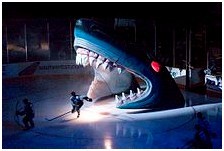
Sharks pre-game entrance through the Shark's mouth
The Sharks' best-known tradition is their pre-game entrance scene. At the beginning of each Sharks home game, the lights go down and a 17-foot open shark mouth is lowered from the rafters. As the mouth is lowered the eyes flash red and fog pours out. Then, a live view of the locker room tunnel with Sharks players is shown on the scoreboard and the goalie leads the team out of the locker room, through the mouth, and onto the ice.[23] The Sharks currently use "Seek & Destroy" by Metallica as their entrance song. Previous entrance songs include Metallica's version of "Breadfan" and "Get Ready for This" by 2 Unlimited.
Any time the Sharks go on the power play, the Jaws theme song is played while the fans do "The Chomp," extending their arms in front and moving them up and down to form a chomping jaw. The song played after each goal is a casio keyboard version of "Rock and Roll Part 2" by Gary Glitter. This was changed for one season, 2006–07, when they used "Holiday" by Bay Area band Green Day, but after the season it was changed back to "Rock and Roll Part 2."
NHL awards and trophies
Presidents' Trophy
• 2008–09
Art Ross Trophy
• Joe Thornton*: 2005–06
Bill Masterton Memorial Trophy
• Tony Granato: 1996–97
Calder Memorial Trophy
• Evgeni Nabokov: 2000–01
Hart Memorial Trophy
• Joe Thornton*: 2005–06
Maurice 'Rocket' Richard Trophy
• Jonathan Cheechoo: 2005–06
All-Star Game head coach
• Todd McLellan: 2009, 2012
(* - traded from the Boston Bruins during the 2005–06 season)
Any time the Sharks go on the power play, the Jaws theme song is played while the fans do "The Chomp," extending their arms in front and moving them up and down to form a chomping jaw. The song played after each goal is a casio keyboard version of "Rock and Roll Part 2" by Gary Glitter. This was changed for one season, 2006–07, when they used "Holiday" by Bay Area band Green Day, but after the season it was changed back to "Rock and Roll Part 2."
NHL awards and trophies
Presidents' Trophy
• 2008–09
Art Ross Trophy
• Joe Thornton*: 2005–06
Bill Masterton Memorial Trophy
• Tony Granato: 1996–97
Calder Memorial Trophy
• Evgeni Nabokov: 2000–01
Hart Memorial Trophy
• Joe Thornton*: 2005–06
Maurice 'Rocket' Richard Trophy
• Jonathan Cheechoo: 2005–06
All-Star Game head coach
• Todd McLellan: 2009, 2012
(* - traded from the Boston Bruins during the 2005–06 season)
Share this page



















